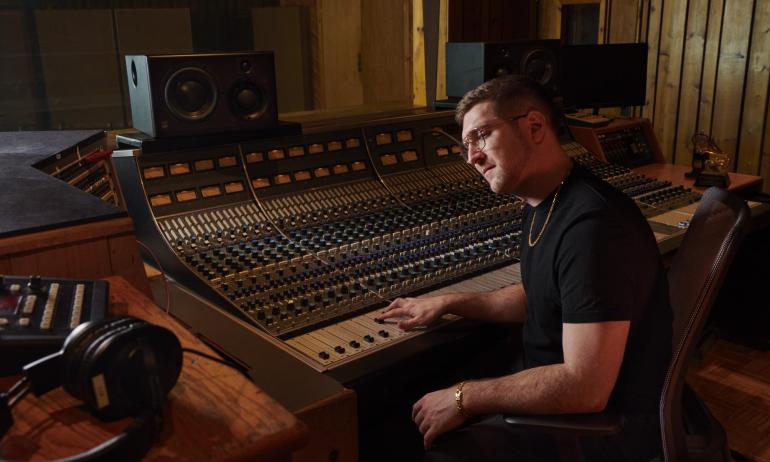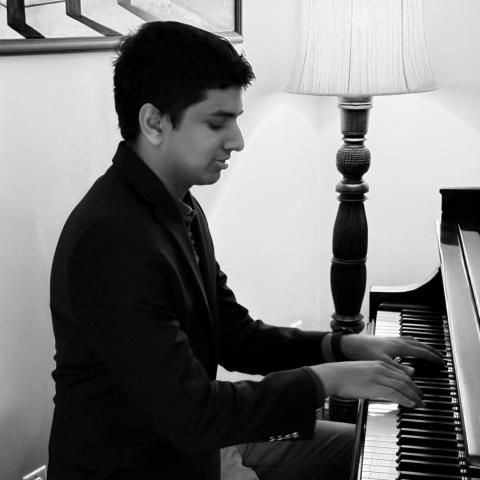The 'T-Pain Effect' Is About Way More Than Auto-Tune

Image courtesy of the artist
There are few artists who have found their voice the way T-Pain has. His signature vocal effect, achieved through the digital processor Auto-Tune, has become ubiquitous in contemporary hip-hop and pop, and is commonly referred to as “the T-Pain effect.” In response to criticism that he uses the tool as a vocal crutch, he’s parodied his own style with the viral song/video “I’m on a Boat” with comedic band the Lonely Island, and he's wowed audiences by doing select performances without Auto-Tune.
In a recent Visiting Artist Series session, Berklee students saw the singular singer behind his public persona and got a rare look into what makes him tick, artistically.
Tom Baskett, assistant professor in the Voice Department—and self-declared fanboy of T-Pain—moderated the discussion, and asked the singer how he discovered his signature effect. While Auto-Tune had been commercially available since 1997 (most notably in Cher’s “Believe”), the effect had been somewhat of a studio secret, and definitely not something T-Pain was aware of as a teen in Tallahassee, Florida.
Nobody had really heard [Auto-Tune] the way I heard it. Not to say that it hadn’t been done, it just hadn’t been done the way I did it.
—T-Pain
He first heard it in the Jennifer Lopez song “If You Had My Love,” produced by production legend Darkchild, spawning a two-year obsessive search for the effect he’d heard in a small section of the song. “I’d get these cracked CDs of plugins from my friends, and I’d go through every preset, and go ‘One of these has got to be it. If it’s available, then I gotta find it,” T-Pain said. At the time, he was deep in the rap scene in Tallahassee and had been searching for something to set him apart. “I was getting drowned out by the sound of everyone wanting to be a rapper…. I was like, 'Man, I’ll never be heard if I’m just that voice in the crowd. I gotta be that one that stands out,'” he said.
He had a hunch that this vocal effect could help him do just that. “Nobody had really heard [Auto-Tune] the way I heard it,” he said, humbly clarifying, “Not to say that it hadn’t been done, it just hadn’t been done the way I did it.”
That level of obsession has been a defining characteristic of T-Pain’s journey to music. In fact, one of his earliest musical memories is of his dad bringing home an old keyboard he’d found on the side of the road, only to find out the thing was crawling with ants. He purged the pests, got it working, and soon rigged it up to a radio, and would while away the hours trying to match basslines on whatever song came over the airwaves.
And though there was no mistaking the aura of celebrity in the Zoom room (T-Pain did, after all, come prepared with sound effects to punctuate his words), it’s his meticulous tinkerer side that Berklee students got to see and relate to. For example, Baskett brought up T-Pain’s iconic, stripped-down performance in 2014 on NPR Music's Tiny Desk concert series. The singer talked about how tired he was that morning, and that he, in fact, didn’t even realize he’d be performing until he arrived at the station and noticed that his bandmates were set up and there were “300 people in an office, just staring at me. I was looking out thinking, 'Oh boy, this is gonna be bad.'"
Watch T-Pain's performance for NPR Music's Tiny Desk series:
The 14-minute set promptly shot down any notion that he needed to use something other than his lungs to sing (as one YouTube commenter puts it: “T-pain didn’t need auto tune, the auto tune needed T-pain”) and has been viewed almost 20 million times. One of those viewers was Berklee alumna Piao Huang B.M. ’20, who in 2019 was inspired to do her own interpretation of T-Pain’s NPR version of his massive hit “Buy U a Drank (Shawty Snappin').” The cover went viral and impressed T-Pain so much that he signed her to his record label, Nappy Boy Entertainment.
Near the end of the conversation, a student asked T-Pain for advice on how new artists can set themselves apart. "You know that person that always says the opposite of what you like? You gotta be that person,” he said, again emphasizing the kind of obsessive searching it takes to land on something that stands out. “You gotta listen to music and you gotta say, 'Well, they already have that.' It’s really about knowing that you’ve done everything you can that you didn’t adapt from anybody.”




